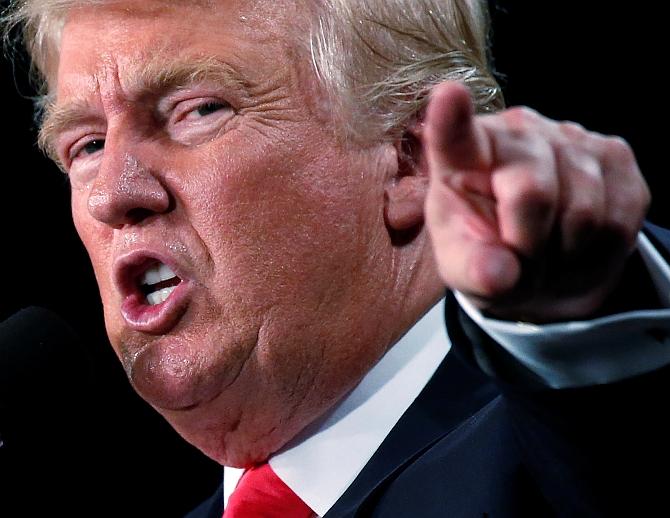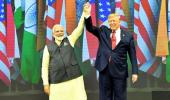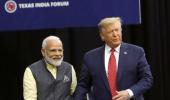'If there is one certainty in this visit, it is that Trump does not follow a script. He is unpredictable,' highlights Ambassador B S Prakash.
The third curtain-raiser before the American president's passage to India next week.

The young man facing me looked smart, well dressed, but nervous.
"Sir, tell me all that they may ask about the Trump visit," he started without ado. "You have been a diplomat, served in America, and my uncle said you will give me valuable clues".
'They' meant the Union Public Service Commission (UPSC).
This is the season for the IAS interviews in Delhi.
Actually, they are called the Personality test and all over India those who have come thus far, after clearing stages of written examinations, are attending coaching institutes for 'mock' interviews for entry not only to the IAS, but to all Services.
The young men and women, these days called the 'UPSC aspirants' -- almost like a different caste -- become extremely earnest and erudite at this stage.
They are at the peak of their preparation and will know the capital and currency of every country, the name of every chief minister of any Indian state, and can offer 10 cogent reasons why the Indian economy is NOT in decline.
Well, as it happens, Trump is coming and, of course, they ought to know everything about this all important visit.
It is highly likely that the interview board will grill them, they have been told.
Hence my visitor, nephew of a dear friend.
"Sir, I have 10 minutes before my coaching institute," he added, perhaps afraid that I will go into a reminiscence mode, a waste of time for him.
"First, you must stress that it is an enormously significant visit," I started.
"Why? It is obvious, the relationship between the world's largest democracy, that is us, and the world's most powerful is of great importance, not only for us two, but globally..." I was warming up.
"Sir, please raise your level of analysis. All this is known to even school kids. I have to use words like geo-strategic, geo-economic, and Indo-Pacific, the coaching center has already told me".
"Trade figures, investment estimates, all this, I know already. I need in-depth analysis," he said with some disdain for my simple words.
I was offended by his tone and temerity, but he is my close friend's nephew.
What to do? I had to raise my pitch.
"Seen in the context of the power dynamics in the 21st century, US-India relations acquire greater salience," I resumed in a solemn tone.
"Analysts agree that this century will see contention and rivalry -- this may not mean conflict, mind you -- between the US, clearly the world's hegemonic power hitherto, and China, the rising power. The center of gravity has shifted from Europe to Asia. In this larger framework or strategic context, if you want to use the term, what will be India's role: A balancer, a net security provider or a stabiliser?"
I was using a lot of big words and even bigger concepts since he wanted them.
I was not sure what they all meant, but why me, most of you too may have heard them in TV debates.
He was taking notes.
"So, India has to choose, tilt one way or the other, between US and China?"
"Never say, that," I promptly rebuked him.
"Use the word 'strategic autonomy'. India is too big, too independent minded, and has its own interests to join any camp. It is a balancer, or a swing player. But given our substantive differences with China, a closer relationship with the US could be in our interest. For the US too, India is a counter weight to China's dominance in Asia".
"I also have to know the difference between Asia-Pacific and Indo-Pacific. It keeps cropping up," he complained.
"Oh! That is a tough one. Indo-Pacific signals more towards the centrality of India in the Indian Ocean and the maritime routes for energy supplies", I suggested.
"It is still a concept that is being developed. It is always wise to say that we believe in inclusiveness and transparency," I added.
"I read a lot about trade disputes. Is that complicated, Sir?"
"It certainly is. Otherwise, it would have been solved by now. Well, break it down to more tangible issues like our high tariffs on Harley Davidson motor cycles, close to Trump's heart, and as high in his belief system as liberty or Hamburgers. Then there are intangibles and intractables like 'data localisation' and in between a host of other issues like diary imports. Americans insist that India should no longer label itself as a developing country and get some concessions on that score. We may have to forego that label, albeit, reluctantly."
"Why? Are we not developed?"
"Are, we? We revel in defying labels. Are we poor or prosperous? Should we look at our nearly $3 billion GDP or less than $3,000 per capita income? But, here, it is a question of some concessions that we were getting for our exports, and we may have to give them up as American trade negotiators are cold and hard. But there are bigger issues," I said getting tired.
"Such as..."?
"Defence is the big ticket item, as the Yanks say. You would know that we are increasingly buying ourequipment from US and less and less from Russia. Why? Better technology, though higher prices and more stringent conditions. Incidentally, this too is a balancing act because we continue to diversify by buying from Russia and France as well. But supplies worth $7 billion, is under discussion and that is a big number real high-tech stuff like integrated air defence missile system, helicopters for the navy, and other stuff. Don't ask me, more. There are many retired generals holding forth on TV on this subject".
The candidate was getting excited.
At this stage, they absorb factoids like a sponge.
"But in all this, don't forget the symbolism and the spectacle," I had to remind him.
"Tell me, Sir".
"Visits are not all substance and outcomes. They are pomp and pageantry, to start with. And political signalling by the leaders to their own constituencies and to the wider world."
I had to stop and tell him that this part was not for the UPSC, but was important in the real world.
After coming out without much damage from the impeachment process, Trump was ready for celebratory triumphalism.
Big bucks for his electoral campaign from the rich Indian Americans was also welcome.
If these are his reasons for embracing a victory lap in the new ''world's largest stadium' in Gandhinagar, Modi too is a master in milking an occasion.
'Namaste' feeds the mood as well as 'Howdy'. That much was certain.
"Sir, you did not cover Pakistan," the IAS aspirant was not taking any chances.
"If you want big words, say, we are de-hyphenated. Pakistan is a nuisance and is irrelevant, strategically."
"But Trump keeps bringing it up,"
"If there is one certainty in this visit, it is that Trump does not follow a script. He is unpredictable," I conceded.
"Will the visit be productive?"
"You can safely assume that it will be pronounced as successful," I declared. "I wish you success too".
But is anything certain with Trump? Does he not define what was unpredictable? Like the IAS exam?
I wished the young man luck, with the Trump question and the exam.
B S Prakash is a former Ambassador to Brazil and a long-standing Rediff.com columnist whose earlier columns can be accessed here.










